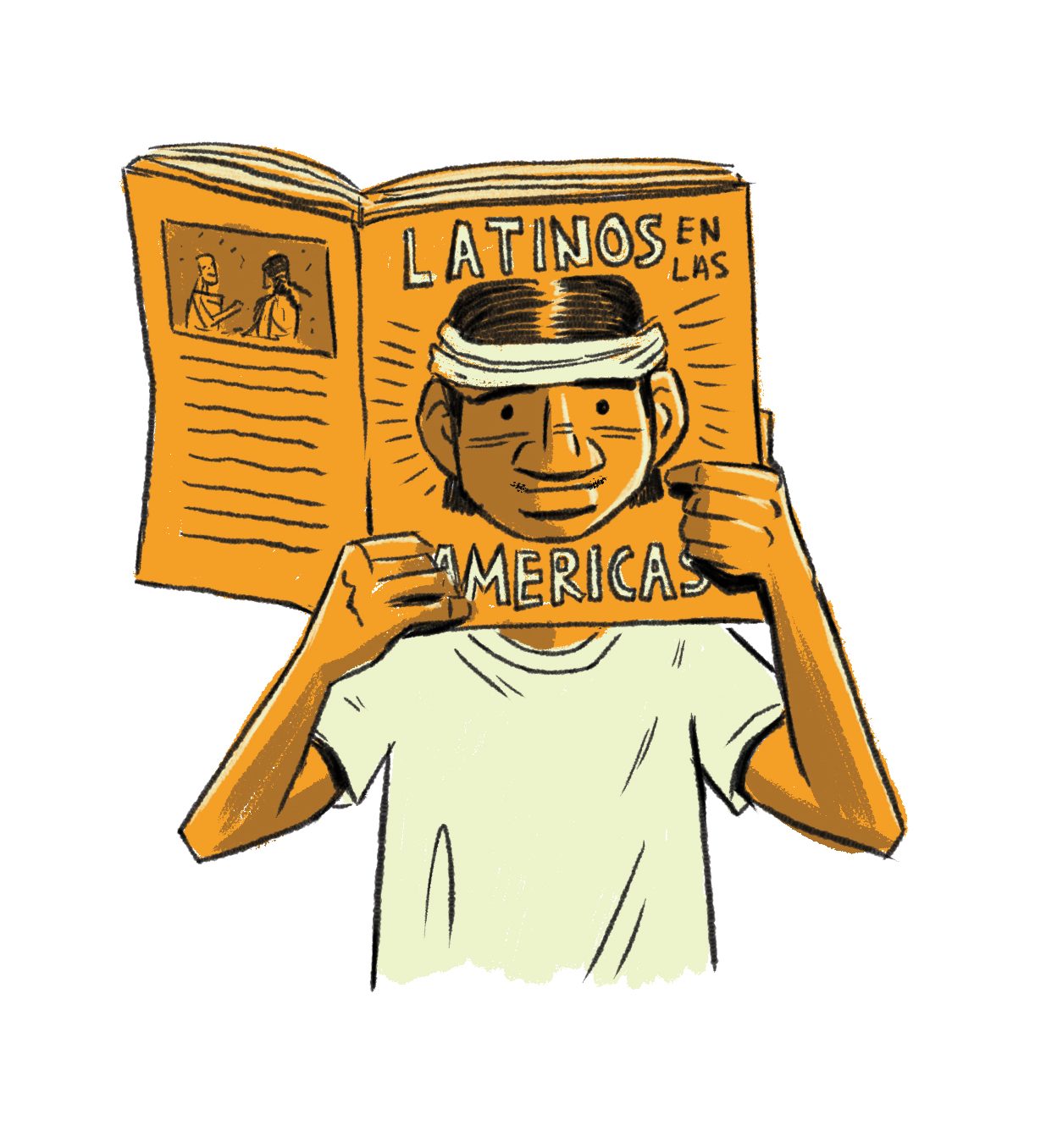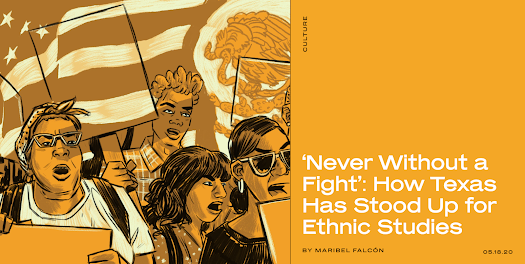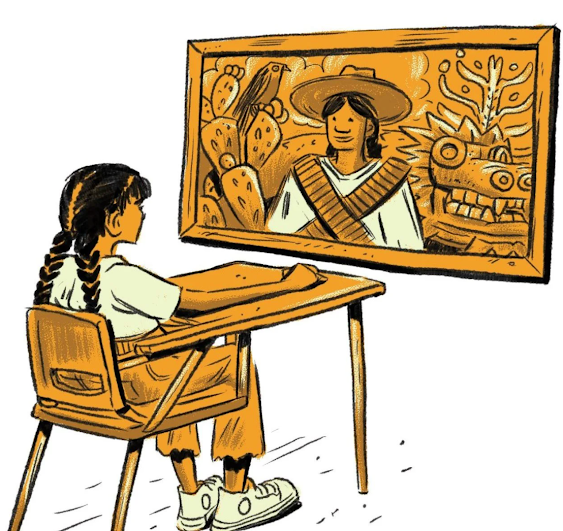So happy to come across this piece in Remezcla by Maribel Falcón—a graduate student at the University of Texas and very talented graphic artist. Reading this and seeing how far we in the Ethnic Studies Movement have come in Texas encourages and inspires me all over again.
Without a doubt, this is the most comprehensive news coverage and analysis of our struggle to date. Great job, Maribel! Thank you so much!
-Angela Valenzuela
Remezcla.com | by Maribel Falcón, May 18, 2020
Ethnic studies have never been granted to us without a fight.
From the late 1960s to now, students and educators have slowly seen the implementation of ethnic studies courses at the college level and in some places, high school programs.
"For all people, as with individuals, the time has come when they must reckon with their history."
That opening line to El Plán de Santa Barbara was released just 50 years ago and is considered the foundation of what is today Chicano/a Studies, yet the words continue to resonate with all ethnic groups. However, a K-12 ethnic studies curriculum isn’t yet a priority across the board. That’s set to change, though, as states like California and Texas add the option for ethnic studies courses—a win achieved through extensive community organizing and political activism.
In 2010, the State of Arizona caused a shock throughout Latino/a communities when it passed the notorious Senate Bill 1070 (otherwise known as the show me your papers law). That decision led to a domino effect of racism that reached public education. Local and state wide politicians started a campaign to abolish the Mexican American Studies program at Tucson Independent School District, despite proof of success. Republicans were able to eliminate the program in 2010 by passing HB2811 and withholding state funds. Their victory was short lived, however. In 2017, a federal judge ruled the law unconstitutional and motivated by “racial animus.”
Illustrated by Zeke Peña for RemezclaThe traumatic process of restricting ethnic studies education set an alarming cry to the entire Latinx community. That moment provoked Texas community organizers and educators to make sure their home state did not follow suit.
Meanwhile, Republicans on the State Board of Education at home attempted to rewrite the social studies curriculum standards. They pushed for American individualism, downplayed slavery and attempted to erase people of color’s contribution to history. The 2012 Texas Republic Party platform stated that the “current teaching of a multicultural curriculum is divisive,” though their claims were unfounded.
The statement was followed by legislative action.
In 2013, then State Representative (now Lieutenant Governor of Texas) Dan Patrick proposed SB 1128, a bill which would have effectively limited ethnic studies courses in universities and community colleges. The bill never progressed, but it did expose their agenda.
Despite ongoing opposition by conservative lawmakers, ethnic studies has continued to develop as a field.
They pushed for American individualism, downplayed slavery and attempted to erase people of color’s contribution to history.
In Texas, a unique strategy by organizers and educators gained the approval of ethnic studies by the Texas State Board of Education (SBOE). The SBOE is made up of 15 members elected by their local regions. They meet four times a year and set the standards for Texas public schools. With their approval, students, teachers and educators can now push their school to offer ethnic studies as an elective.
Prior to that, individual school districts like the Houston Independent School District had already started offering the courses successfully. However, without standards set by the SBOE, it was difficult for teachers across the state to obtain resources and approval to implement the courses in their school districts. Educators and members of the National Association of Chicano/a Studies (NACCS) Tejas Foco Pre-K to 12 committee were instrumental in pushing for the approval of ethnic studies.
Illustrated by Zeke Peña for Remezcla
In 2014, in response to a polarizing political environment in education throughout Texas and Arizona, the NACCS Tejas Foco PreK to 12 committee made a specific request to the SBOE to include Mexican American Studies (MAS) as an approved elective. It was a bold move that attracted strong allies. SBOE member Ruben Cortez Jr. formally introduced it as an agenda item to the board. In this meeting, the board denied the request. However, seeing that there was a need for resources, the board set out a call for textbooks that could apply to the ethnic studies course curriculum.
Texas is home to 5 million students and over 1,000 public school districts. Being such a large state, the choices made for the Texas public education system sets a standard across the United States, especially for textbooks.
One book that was formally presented to the state board caused academic outrage. The book, “Mexican American Heritage,” was by a former SBOE member, Cynthia Dunbar. An ad hoc committee of professional educators evaluated the book using standards set by the American Historical Association. Despite obvious factual errors, they found that the authors of the book “failed to engage in critical dialogue with current scholarship and, as a consequence, presented a prolific misrepresentation of facts.”
The choices made for the Texas public education system sets a standard across the United States, especially for textbooks.
Community uproar combined with expert research could not be refuted and, after much public testimony, the SBOE rejected the textbook. Instead, the board voted to approve MAS as an elective. However another conservative SBOE member, David Bradley, objected to “hyphenated Americanism” and the course was approved as Ethnic Studies: Americans of Mexican Descent. That name, of course, did not go over well.
Again, organizers had to react to their adversaries. Even if the course was approved, what would that mean if the name was offensive to the community it was meant to serve?
Community members across the state, once again, organized to make it right. The dread of community outrage at yet another SBOE meeting, caused members to hesitantly consent to their demands by voting to change the name back to its formal name as a field of study—Ethnic Studies: Mexican American Studies.

According to 2018-2019 data, Latinx students accounted for the largest percentage of total enrollment in Texas public schools at 52.6%. Meanwhile, the State of Texas loses 11 students to dropout every hour—that’s 1 out of every 5 students with Black and Latino/a students being more than twice as likely to not graduate.
The good news is, research shows that students who take culturally relevant courses are more likely to be engaged with their education than those who do not. With that in mind, educators and community organizers in Texas worked hard to push the effort forward.
The State of Texas loses 11 students to dropout every hour—that’s 1 out of every 5 students with Black and Latino/a students being more than twice as likely to not graduate.
One of the key leaders in this movement is renowned author and educator Dr. Angela Valenzuela who serves as the director of the Texas Center for Educational Policy at the University of Texas at Austin. She argues in her most recent work that, throughout this process, the NACCS Foco Pre-K to 12 committee “side steps the colonial matrix of power”—which she defines as consisting of the Texas State Board of Education, the Texas State Legislature and large corporate interests in education.
“Organizing is key. Working as a collective is key,” she stated when asked about what led to their success. “What folks need to know is that when they want to accomplish something, they need to work in concert with each other. For this to happen, it takes a lot of trust. And trust is something that we built up over many months and years that we convened to address our absence in the curriculum. Many in the organization were already friends through NACCS national and so there was a solid root of not only scholar-activist identities, but friendship, as well. Working like family is what made, and continues to make us powerful.”
The good news is, research shows that students who take culturally relevant courses are more likely to be engaged with their education than those who do not.
National organizations like the NACCS were vital in providing the foundation for community amongst the movement’s organizers. Several representatives from the Texas Legislature and other affiliated organizations such as the Latino/a Education Task Force, the Mexican American Legislative Caucus, the Senate Hispanic Caucus, House and Senate Democratic Caucus and the Legislative Study group aided the effort by publishing supportive policy agendas and writing official letters of support for the course. State universities, like the University of Texas at Austin and the University of Texas at San Antonio along with community colleges like Palo Alto Community College in San Antonio, were also instrumental in providing resources and support for the organizers.
Tony Diaz, founder of Librotraficante, is a key organizer in the movement and notes that it is the community’s cultural capital that has made this effort succeed. Their community-focused organizing was extensive in all major Texas cities, including all day arts and cultural events, poetry readings, pláticas and more. Their political activism was well organized and also state-wide. Strategic use of social media, informational websites and traditional print sources and radio programs were also utilized in informing the public about this issue. All this worked together to push this effort forward. Though this list is not exhaustive, as with any major victory, there are countless community members who dedicated endless hours of labor and love to the cause.

Now that Mexican American studies is approved by the Texas State Board of Education, what’s next?
The growing Texas Latinx population will reportedly outnumber white residents and shows the most increase amongst it’s younger population. This means upcoming generations of Latinx students have the opportunity to take culturally relevant courses, and see themselves reflected positively in their textbooks. Several of the existing MAS courses offered by school districts also allow for the elective to count towards college credit—which is yet another incentive for students to take the course.
Ethnic studies courses benefit teachers as well. The elective course encourages teachers to incorporate creative ways of critically engaging students with the curriculum. For community minded educators, this means introducing the work of local artists into their lesson plans. A method educator Celinda De La Fuente uses in her Mexican American Literature class. De La Fuente teaches at her alma mater, John Jay High School in San Antonio, Texas, and is a graduate of the UTSA Mexican American Studies Teacher’s Academy. When asked about this experience teaching, she stated,
“Of course I teach them what I am supposed to teach. But then I bring other pieces that can connect to the themes, like Amalia Ortiz who is here in San Antonio. She has a book of poetry called Rant. Chant. Chisme. and I brought in a poem called ‘Colors’ that is about the San Antonio West Side and I let them know that. As they are reading it they say ‘oh this is about us, she's talking about us.’ and they truly appreciated that poem. So when I bring in other poetry written by Chicanx authors, they really have more appreciation for it. It’s almost like a reverence,” De La Fuente states.

Of course, not everyone in the class is Mexican and folks respond to the content differently.
“At first they were like ‘I’m not Mexican, why am I reading this?’ and I said, think about your own culture, how does this relate to it? I had to ask that question and then they understood,” she said. “I tell them that everyone has a story, everyone has a narrative. What’s yours? History and literature are related—you can't have one without the other. If I wasn’t an English teacher, I’d be a history teacher… We talk about the different types of history. In my class I'm gonna talk about African American history, I’m gonna talk about the Japan concentration camps, I talk about all these different things depending on what we are reading and how the walks are very similar.”
Texas is setting an example in public education by offering students the opportunity to learn about the shared struggles and victories between people of color and thus, enriching the education of new generations to come.
Ethnic studies does not end with Mexican American studies, as this SBOE approval has opened up possibilities for additional courses to be approved. In September 2019, the board began to discuss African American studies based on the curriculum set by the Dallas Independent School District and on April 17, 2020 in a unanimous vote, the Texas State Board of Education approved African American studies. Now Texas students can take a second ethnic studies course beginning in the 2020-2021 school year and it doesn't stop there. Native American studies is also on it’s way to be proposed and ultimately approved by the SBOE. In these courses, Texas is setting an example in public education by offering students the opportunity to learn about the shared struggles and victories between people of color and thus, enriching the education of new generations to come.



